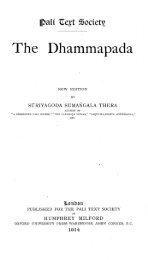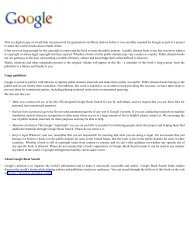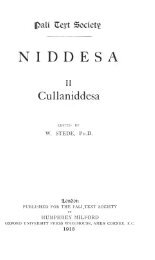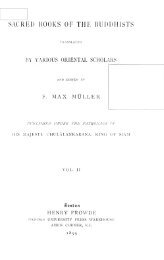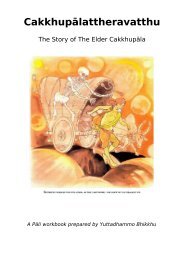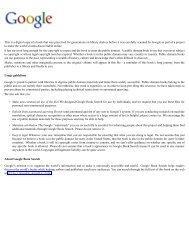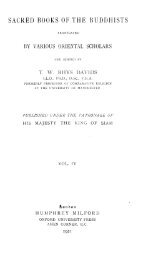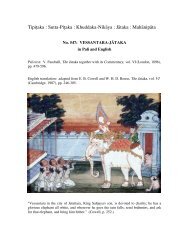Lessons In Practical Buddhism - Sirimangalo.Org
Lessons In Practical Buddhism - Sirimangalo.Org
Lessons In Practical Buddhism - Sirimangalo.Org
Create successful ePaper yourself
Turn your PDF publications into a flip-book with our unique Google optimized e-Paper software.
I’m just a robot or just a physical organism? Really non-self is<br />
when you say to yourself, for example, “hearing, hearing,”<br />
and the mind expects the sound to go in this way or go<br />
according to its desire, to continue – that you will say,<br />
“hearing, hearing,” and there will always be something for<br />
you to hear. But then the sounds stop, and then you realize<br />
that actually it’s quite stressful, this experience of sound,<br />
since you don’t know when it’s going to start and when it’s<br />
going to stop. You see that the experience, the sound at<br />
your ear, your experience of hearing, is non-self.<br />
Maybe it’s hard to understand if you’re not practicing, but I<br />
think with even a little practice you can understand. You can<br />
see that your experience is not under your control. You can’t<br />
make me start to talk. You can’t make the sound arise, so<br />
when you say, “hearing,” you feel this stress, this shaking up<br />
of the mind, where the mind used to think, “here I am<br />
listening, and I can sit here, and I’ll just listen, listen, listen,”<br />
but the listening only occurs because of the hearing.<br />
It sounds so simple and dumb actually, like this can’t be the<br />
wisdom we’re looking for, but when you actually practice,<br />
you see how stressful it is for the mind, that the mind really<br />
is silly, the mind really is childish and ignorant in a kind of<br />
embarrassing way; intellectually we already know it, but the<br />
mind is betraying us. We already know that this is the case,<br />
but we don’t really know it. We expect everything to go<br />
according to our desires, according to our wishes, and so we<br />
suffer when it’s not according to our wishes. When we see<br />
this, we come to know that clinging and craving are the<br />
causes of suffering.<br />
asubhasaññā<br />
Number three is asubhasaññā. This perception is also very<br />
useful for meditators. Knowledge of loathsomeness arises<br />
naturally in vipassanā meditation, but some people practice<br />
meditation on loathsomeness: They break up the body into<br />
parts: hair, body hair, nails, teeth, skin, and so on – all<br />
thirty-two parts of the body. They break it up and look at<br />
one part, the hair on their head for example, and they come<br />
to realize how this hair is actually like some kind of moss<br />
growing on a dung pile. You don’t have to imagine how<br />
84



